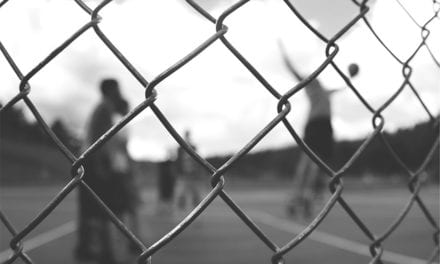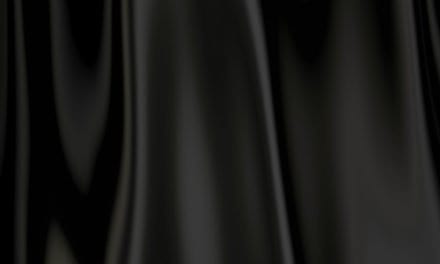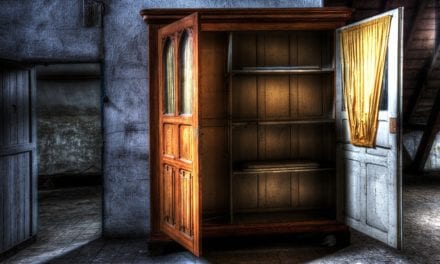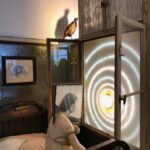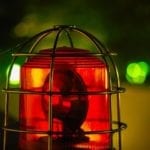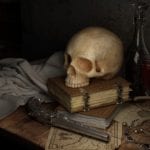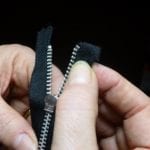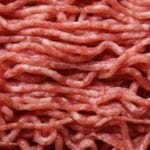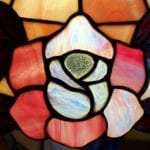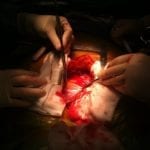Doctors and Patients
The doctor eyed his pipe in its stand, freshly packed with Virginia plug. It was Christmas, the one day in the year that a put-upon doctor in a rural outpost should expect some respite. His patients would exchange presents, tend to the health of their incorporeal souls, and feed their mortal bodies on greasy fowl and over-boiled cabbage. He had planned a day of remedial inactivity. After eating, he would relax with a Gogol story and the music of Brahms and Schoenberg.
Sitting in the scuffed Chesterfield before the fire, he leafed through a day-old newspaper. He soon tired of the reports of rising animal feed prices and the catalogue of dinner dances that passed for society in this backwater. He took a sip of Glűhwein and ate a piece of the cinnamon cake that was a specialty of the region served at Christmas. Using a poker, he prodded the burning wood, showering sparks and glowing embers that rushed up the chimney. He added two logs and returned the poker to the frame.
He checked his watch. There was not enough time before his meal for a proper smoke. He could hear the sound of cutting and the clanging of pots from the kitchen. The doctor would be dining alone. His wife died two years earlier. It was a protracted and painful end, and he had been a helpless bystander. She endured her suffering in silence, no word of protest, just a regretful fatalism. He sought solace in solitude, but missed her terribly.
He was sure the servant would botch his Christmas meal. She was the daughter of the butcher, Grabowski, who had provided venison for the main course. The girl had been acting strangely all morning, casting surreptitious looks in his direction, an unreadable grin planted on her coarse features.
~~~OOO~~~
His cheeks and nose were suffused with the smoky heat from the fire. He could not drag his eyes from the flames wrapped around the red-hot coals, conjuring impressions and events from his past. He recalled his father in-law who had passed the medical practice to him. He saw him slumped in a chair in his surgery, deep lines etched into his pallid face. A man in his early fifties who could have passed for seventy. Pulling up his sleeve, he exposed scaly red patches of severe psoriasis. His arm was smeared in blood from open sores caused by rough scratching.
“This is because of that confounded rabble,” the older man grumbled. He was referring to his patients. The interminable procession of the infirm had caused his flesh to crawl to the extent that he scraped and gouged his arm in frustration until he drew blood. “I am allergic to them,” he groaned.
Before long, he suffered symptoms of severe allergy, rhinitis, stomach pains and bleeding ulcers. There was little doubt this led to his enforced retirement.
He found his father in-law unreasonably exacting and callous. Nevertheless, over time he came to understand his predecessor’s attitude towards the patients. He considered, with dismay, the assortment of malingerers who dragged themselves daily into his rooms to expel their fouls gases and offer up fungal digits, unwashed anuses and fetid groins for his inspection. There was the librarian and her plump piles, the water diviner with his eczema, the gravedigger and his fallen arches.
For the most part, those who came to see him were not seriously ill or even sick. He was convinced their visits were part of a routine. A stop on the way as they did their rounds of church, shoe shop, baker, fishmonger and doctor. He suffered in silence when handling the genitalia of Schulz, the cow farmer. He accepted the putrid bouquet of halitosis from the stuttering Löhr, head chef in the town’s largest hotel. He ran his hands along the stumpy legs of Frau Held in order to assess the state of her varicose veins. This was part and parcel of his job, enshrined within the Hippocratic Oath.
There was the consultation scheduled the coming week with Sommer, the morbidly obese chocolatier. Even a doctor’s mind could not expunge the scenes from the previous session with the outsized confectioner. The mound of sweating blotchy flesh exposed from xiphisternum to pubis fluidly mounted on the examination table. Sucking sounds accompanied every movement of the wobbling mass of flesh and guts.
The yielding skin produced fluid thrills to the touch. Auscultation and application of the stethoscope magnified the chocolatier’s internal music, deep bassoon notes that polluted the room with sulfurous gases. The vapor of cold sweat from the avoirdupois body wafted over his cheeks. It was meat and potatoes to the experienced physician. He ignored the lapping of fat and coquettish squeals in response to the tickling caused by contact with his beard. The doctor was trained for this. Had he not waded through thick tomes on anatomy in draughty reading rooms, and bent over intricate dissections in harshly lit laboratories? He had the degrees and certificates to prove it.
What he could not tolerate was the whining litany of grievances and the contemptible moaning of his patients. The pathetic inadequacy of these self-serving complainers and their crude sense of entitlement. He was their servant, there to do their bidding. He was to accept, without reservation, responsibility for their imagined infirmity. Accept also their dissatisfaction and implicit disapproval.
He should, of course, brush off these irritations like stray burrs that had become attached to his clothing. He awoke each morning to the whispered words of his dying wife, her lips grey and cracked, her wrists as thin and brittle as twigs. “You must look after yourself.”
She was gone and all he had to look forward to was the diurnal parade of facial disfigurements, misshapen torsos, rotting extremities and decrepit minds. She faced death with concern only for him as the cancer cut through her organs. His patients saw nothing but their own needs. Their fear of mortality was inversely proportional to their love of life. They begrudged each second that took them closer to their maker.
He sometimes wondered how doctors in other towns dealt with the demands of their patients. He never had the opportunity and was not sufficiently interested in finding out. He considered removing himself from his tormentors, following the lead of his father in-law. Why yield to their stupidity? Why be held to ransom by the abject ignorance of these bogus martyrs? He became increasingly brusque in his dealings with the good-for-nothings who came to him. He had no time to listen to imprecise responses to his questions. How was it possible to arrive at a diagnosis if he was not provided with an accurate statement of the symptoms?
~~~OOO~~~
He could see the servant through the open kitchen door. She was wearing a ratty floral housecoat over a white blouse and black pleated skirt. As he watched, she raised a hand to correct a stray tendril of hair at her temple, her pinched nose twitching at the effort. He took in the Christmas bauble she had pinned to her lace collar, and her blank expression as she consulted the list of instructions he had provided in his tidy handwriting.
He should pay a visit to the kitchen to move things along. She was no doubt straining to finish preparing the meal so she could join her friends at the municipal outdoor ice rink, which was the custom of the younger folk at Christmas. There she would be pressed for details of how the ogre they had for a doctor spent the holiday. She stood on a stool and reached for something in a cupboard. Her breathing was labored and he had diagnosed early stage emphysema, though he had yet to tell her.
He anticipated the starter of sea bass and fennel soup followed by brown trout with crayfish, accompanied by a fine Riesling. Then, braised venison in redcurrant sauce with petit pois, scalloped potatoes and celeriac. Rounded off with a rich trifle and cheeses supplied by Sieloff, one of his more bothersome patients. He had already decanted and set aside a heavy Shiraz for the latter courses—not particularly festive fare, but it was to his taste.
Drowsy from the fire, the doctor drifted into semi-sleep. He pictured himself in the surgery, lancing boils on Sieloff’s neck. The man was a veritable farm of boils with multiple harvests of excrescence, cysts, carbuncles and gargantuan pimples. He was staring at the whorl of the cheesemaker’s right ear, transfixed by the shadows at the root.
~~~OOO~~~
The servant touched his shoulder lightly. He roused himself, and in a flash of anger, demanded to know why he was being disturbed. She flinched at his aggression. A visitor had come to see the doctor. The servant was making no sense, wheezing and cowering before his furious glare. Something incomprehensible about a sick patient and a house call he must make. What was this nonsense? This day of all days, he was not available for house calls.
A face appeared over the servant’s shoulder. Closely cropped black hair and clean-shaven ruddy cheeks. Instinctively, the doctor caressed his straggly beard. The man introduced himself as Willi Dietrich, a farmer with a small holding that was a ten-minute drive from the surgery. The doctor did not know him but he could not distinguish one yokel from all those he encountered in his surgery.
“We have a young boy at home with a high fever,” he said quietly, a grave monotone with no intonation or inflection.
“The boy is very sick, he’s been suffering convulsions.”
He grabbed the doctor’s wrist. The man had startlingly blue eyes that stared without flickering.
“Please, please,” he begged in his flat expressionless voice. “Have pity, the boy’s life is at stake.”
The doctor shook his head with displeasure. He freed himself from the man’s grip and left the room. He passed through the kitchen where he noticed a place had been set at the table with cutlery, plates and wine glass. This was surely not intended for him, as he would take his meal in the dining room.
He grabbed his medical bag, a battered voluminous split-handled Gladstone. He could hardly refuse if a child was seriously ill, but it was damned inconvenient. Was he never to be allowed any rest in this god-forsaken hell-hole? He had been hoping to spend an hour or two that evening working on the paper he was to present to the Academy of Science and Medicine. This was a study of the chemical pathways in the stimulus of pain receptors. The work was a diversion to exercise his brain and exorcise the crushing disappointment of his medical duties. Actual experimentation was some way off. He still had to solve the knotty problem of securing suitable candidates for testing among his patients.
The visitor was waiting in the hallway. He reversed to the entrance in short steps. His eagerness to leave was galling. The doctor sought out the servant to discuss the place setting in the kitchen but could not find her. He decided it could wait. He should deal first with this unforeseen intrusion and return as soon as possible to reclaim what remained of his Christmas Day.
~~~OOO~~~
As the doctor left the house, he looked up and saw the servant observing him from an upstairs window. She had the same ambivalent smile he noticed earlier. What was the meaning of that Cheshire cat grin? He had no time to consider this further as he was taken by the elbow and rushed to a car. It was an old model, badly rusted, muddy, and coated in all manner of rural detritus. The doctor sat in the back seat as Dietrich started the engine, and reversed the car.
Uschi Held was standing in the driveway. She raised her hand as the car turned. The doctor caught a glimpse of her face as they drove past. Her sly look was unsettling and out of character. The venerable old matron was a regular visitor to his surgery with her imaginary nervous complaint. He had prescribed a course of epothilones that landed her in the hospital for a week. As she persisted in prevailing on his time with fictitious complaints, he provided her with actual cause for complaint. In retrospect, he regretted this. It was a sign that he was losing control. Should he look to himself to make changes, modify his outlook and lessen his rancor? To what end? To propitiate the delinquents and frauds under his medical care? No, that was a step too far.
Weber, the accountant, was leaning against a tree on the side of the road, watching the car as it passed. What was he doing there? The doctor turned in his seat in time to see the accountant nod his head. There was something disconcerting and judgmental in his manner. It was only last week that the doctor forcibly removed him from the surgery. Weber arrived every Tuesday with ambiguous complaints of discomfort in his lower back. The doctor had tired of Weber’s grousing that the treatment he received was inadequate.
It was because of patients like Weber that he had installed a large timer on the back wall of the surgery. The device was constructed to his precise instructions. He allocated ten minutes per consultation. Once a patient entered the surgery, he pressed a button that began the timer. Large red digital numbers on a black background counted down the hundredths of seconds. If the doctor did not receive a clear, succinct, and informative answer to a question, he pressed the button a second time and the countdown was accelerated. There were five settings, each increasing the speed of the countdown by a factor of two. A particularly obtuse patient could find the consultation had ended before it began. The doctor would rush the wide-eyed reprobate from his surgery, as he had with Weber, and deposit him outside the front door. He told the accountant that a repeat performance would result in a banning order.
Dietrich drove faster than advisable on the rutted and winding country roads. The doctor asked for more details regarding the sick boy’s symptoms. He wanted this business over and done with as soon as possible. He received no answer to his inquiries, just repeated thanks.
“It is very good of you to come out on Christmas Day. We are lucky to have such a kind doctor”.
The doctor felt rage charge through his body. If this had been the surgery, he would have pressed and pressed again the timer control, kicking this noisome hayseed out on his arse.
He saw Manglitz seated with two other geriatrics at a bus stop. That made no sense, as the buses did not run on Christmas Day. Laconic old Fichtel emerged from behind the bus shelter, leaning on his blackthorn stick. He raised his flat cap in a salute that Dietrich returned with a thumbs-up sign.
These old codgers occupied most of the doctor’s time. In truth, some of the dinosaurs were seriously indisposed with long-standing disabilities. All the more reason to expect cooperation from such seasoned convalescents. But no, they were incapable of explaining their ailments through ignorance and willfulness. He may as well have been operating a veterinary surgery for all the assistance these miserable creatures provided. His father in-law had applied for a license to operate a euthanasia facility. The reactionary authorities rejected the application. Perhaps he should try again.
He wanted to shout at Manglitz and Fichtel, ‘There is nothing wrong with you!’ To this end, he tried to roll down the window but it would not budge. It was then he noticed the ball of rough blankets on the seat beside him. They bore stains that were carmine red, discolorations that suggested dried patches of blood. He lifted one corner and revealed rough metal manacles, the chains thick and gleaming.
~~~OOO~~~
The car slewed to one side as Dietrich turned abruptly into a neglected courtyard, bouncing over deep potholes, spilling filthy water from the tires.
The doctor had a vague impression of a three-storied, stone farmhouse and an asymmetrical distribution of windows. Dietrich held his arm and escorted him past abandoned farm machinery. They entered the front door, and the doctor had a brief view of two figures moving awkwardly down a staircase, presumably to a basement. They were carrying a heavy bundle between them. He thought he recognized Patzke, the schoolteacher, but he would surely be at home with his young family.
The doctor was led into a kitchen that was hot and airless. An enormous open fireplace commanded one wall. He sat at a table crowded with plates bearing the residue of a Christmas meal. The room was poorly lit and he could barely make out an elderly woman in a shawl. She was sitting on a low stool as she tended to the fire. Across from her, an old man moved back and forth in a rocking-chair, a briar pipe clenched in his withered mouth. Wisps of smoke from the bowl merged with soot from the fire that bled into the room. The familiar smell reminded the doctor of his own pipe and the meal that awaited him at home. He demanded to see the patient.
Dietrich stood with his back against a dresser, answering, “We must wait until the boy is made ready for you.”
A plate was put before the doctor. It bore slices of cinnamon cake. He was handed a glass of hot rum, “Please have this while we wait.”
The old man by the fire began to speak in a monotone drawl. He praised the doctor, his care for the community, his deep regard for his fellow man, “You are a great doctor and we are fortunate to place our wellbeing in your caring hands.” This was followed with more encouragement to drink his rum, “Please accept our hospitality on this Christmas Day. We wish to express our gratitude to you, our good kind doctor.”
The old man tapped his pipe against the rocking chair, saying, “All your patients think highly of you. We often discuss your good work.” And gesturing toward the table, he added, “We had a good number of visitors today, all of them your patients.”
The doctor looked at the dirty dishes and recalled those they had passed on the way to the house. He could take no more of this. He stood up from his chair and insisted that he be allowed to see the patient.
“Finish your rum,” his host smiled.
He drained the glass, grimacing at the acrid grittiness. Dietrich led him from the kitchen. They mounted a darkened staircase. The doctor tripped on a step and felt the man’s hands move to support him. He suppressed his chagrin and hurried up the remaining steps.
The bedroom was even murkier than the kitchen. Heavy curtains in the window were fully drawn. The doctor stumbled forward with arms outstretched to feel his way. The dank air was both sweet and foul. He could see little in the darkness but his other senses were heightened.
The stench in the room was familiar. He recalled it from a prolonged stint working with the terminally ill. His mentor at the time drew his attention to the smell, this very special redolence. All the disinfection, sterilization, and scrubbing could do nothing to dispel it. “The perfume of death,” his superior had said grimly. This was the fragrance produced by the final breath. The accumulation of final breaths. The terminal exhalation swollen with despair, all kinetic energy dissipated. Death had visited this room more than once.
The light from a bedside lamp provided partial illumination. The doctor moved towards the bed and placed his bag on a mahogany nightstand. He pulled back the covers to reveal the recumbent body of a middle-aged man. Where was the sick boy? He turned around but did not receive an answer. The body before him was badly bruised and partially clothed, shirt torn and ripped, undergarments stained with blood.
He moved closer to see the extent of the damage, which was clearly severe with multiple fractures and dislocations. The victim, and surely, he was the victim of a vicious attack, had lost a significant amount of blood.
The doctor was about to confront Dietrich when he detected movement on the bed. The patient’s eyes were bloodshot but alert. A hand clawed weakly at his arm, the mouth opened briefly, shut, and opened again. The doctor leaned over, his beard brushing the scarred chest. The sound from the bruised lips was faint and confused. He strained to hear but could not make sense of what was said.
The hand dropped feebly onto the bed. The doctor felt lightheaded. The effort to concentrate on those words had been too great. He was drained of energy, nauseous. He was losing his balance. There were others in the room. The limited space was crowded with figures, arms upraised. He was barely aware of the blows that rained down on his back, his shoulders, his legs, his head.
~~~OOO~~~
The hacking at the inside of his skull released a sharp debilitating throb. He wanted to moan but made no sound. His body was encased in a rigid plaster-cast of pain. He lay immobile on his back, unable to move, but he could think and he could remember. The servant’s knowing smirk, the trip in the car, the others on the road, the oppressive kitchen, the rum, the battered body. There had been no feverish child.
He found he could flutter his eyelids. He saw shadows on a wall in the grey light. He was lying in a bed. He had no idea how long he had been there. Days or possibly weeks. A figure emerged from the doorway. He seemed familiar. An elderly man, silver haired with a goatee and disapproving demeanor. He carried a bag, a physician’s bag. He looked about the room, his stern expression giving way to uncertainty.
He must talk to him. He opened his cracked lips. His mouth was parched, his throat desiccated. His body was a battlefield of wounds, of soundless cries for help. He was going to black out.
No, he was still conscious. He must speak. An excruciating burn resonated from his guts, through his spine, and erupted in his head. He must communicate. The older man bent down. He tried to reach out but he could not move a single limb, not a single digit.
He would speak. He must speak into the ear that was turned to his face. Speak. Speak. “I too am a doctor.”



